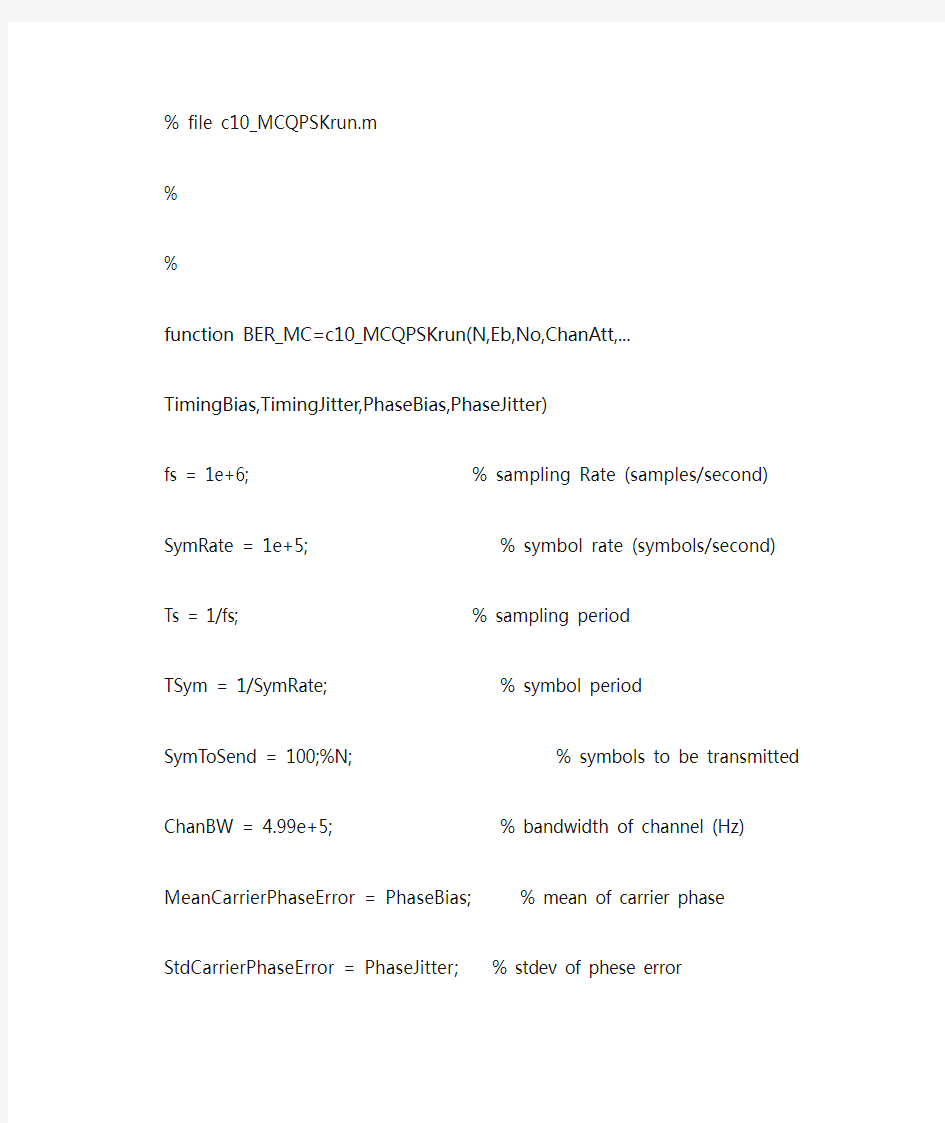

% file c10_MCQPSKrun.m
%
%
function BER_MC=c10_MCQPSKrun(N,Eb,No,ChanAtt,...
TimingBias,TimingJitter,PhaseBias,PhaseJitter)
fs = 1e+6; % sampling Rate (samples/second) SymRate = 1e+5; % symbol rate (symbols/second)
Ts = 1/fs; % sampling period
TSym = 1/SymRate; % symbol period
SymToSend = 100;%N; % symbols to be transmitted ChanBW = 4.99e+5; % bandwidth of channel (Hz) MeanCarrierPhaseError = PhaseBias; % mean of carrier phase StdCarrierPhaseError = PhaseJitter; % stdev of phese error MeanSymbolSyncError = TimingBias; % mean of symbol sync error StdSymbolSyncError = TimingJitter; % stdev of symbol sync error ChanGain = 10^(-ChanAtt/20); % channel gain (linear units) TxBitClock = Ts/2; % transmitter bit clock
RxBitClock = Ts/2; % reciever bit clock
%
% Standard deviation of noise and signal amplitude at receiver input.
%
RxNoiseStd = sqrt((10^((No-30)/10))*(fs/2)); % stdev of noise
TxSigAmp = sqrt(10^((Eb-30)/10)*SymRate); % signal amplitude
%
% Allocate some memory for probes.
%
SampPerSym = fs/SymRate;
probe1 = zeros((SymToSend+1)*SampPerSym,1);
probe1counter = 1;
probe2 = zeros((SymToSend+1)*SampPerSym,1);
probe2counter = 1;
%
% Counters to keep track of how many symbols have have been sent.
%
TxSymSent = 1;
RxSymDemod = 0;
%
% Buffers that contain the transmitted and received data.
%
[unused,SourceBitsI] = random_binary(SymToSend,1);
[unused,SourceBitsQ] = random_binary(SymToSend,1);
%
% Differentially encode the transmitted data.
%
TxBitsI = SourceBitsI*0;
TxBitsQ = SourceBitsQ*0;
for k=2:length(TxBitsI)
TxBitsI(k) = or(and(not(xor(SourceBitsI(k),SourceBitsQ(k))),...
xor(SourceBitsI(k),TxBitsI(k-1))), ...
and(xor(SourceBitsI(k),SourceBitsQ(k)),...
xor(SourceBitsQ(k),TxBitsQ(k-1))));
TxBitsQ(k) = or(and(not(xor(SourceBitsI(k),SourceBitsQ(k))),...
xor(SourceBitsQ(k),TxBitsQ(k-1))), ...
and(xor(SourceBitsI(k),SourceBitsQ(k)),...
xor(SourceBitsI(k),TxBitsI(k-1))));
end
%
% Make a complex data stream of the I and Q bits.
%
TxBits = ((TxBitsI*2)-1)+(sqrt(-1)*((TxBitsQ*2)-1));
%
RxIntegrator = 0; % initialize receiver integrator TxBitClock = 2*TSym; % initialize transmitter
%
% Design the channel filter, and create the filter state array.
%
[b,a] = butter(2,ChanBW/(fs/2));
b=[1]; a=[1]; % filter bypassed [junk,FilterState]=filter(b,a,0);
%
% Begin simulation loop.
%
while TxSymSent < SymToSend
%
% Update the transmitter's clock, and see
% if it is time to get new data bits
%
TxBitClock=TxBitClock+Ts;
if TxBitClock > TSym
%
% Time to get new bits
%
TxSymSent=TxSymSent+1;
%
% We don't want the clock to increase off
% to infinity, so subtract off an integer number
% of Tb seconds
%
TxBitClock=mod(TxBitClock,TSym);
%
% Get the new bit, and scale it up appropriately.
%
TxOutput=TxBits(TxSymSent)*TxSigAmp;
end
%
% Pass the transmitted signal through the channel filter.
%
[Rx,FilterState]=filter(b,a,TxOutput,FilterState);
%
% Add white Gaussian noise to the signal.
%
Rx=(ChanGain*Rx)+(RxNoiseStd*(randn(1,1)+sqrt(-1)*randn(1,1)));
%
% Phase rotation due to receiver carrier synchronization error.
%
PhaseRotation = exp(sqrt(-1)*2*pi*...
(MeanCarrierPhaseError+(randn(1,1)*StdCarrierPhaseError))/360);
Rx=Rx*PhaseRotation;
probe1(probe1counter)=Rx; probe1counter=probe1counter+1;
%
% Update the Integrate and Dump Filter at the receiver.
%
RxIntegrator = RxIntegrator+Rx;
probe2(probe2counter) = RxIntegrator;
probe2counter = probe2counter+1;
%
% Update the receiver clock, to see if it is time to
% sample and dump the integrator.
%
RxBitClock = RxBitClock+Ts;
RxTSym = TSym*(1+MeanSymbolSyncError+(StdSymbolSyncError*randn(1,1)));
if RxBitClock > RxTSym % time to demodulate symbol RxSymDemod = RxSymDemod+1;
RxBitsI(RxSymDemod) = round(sign(real(RxIntegrator))+1)/2;
RxBitsQ(RxSymDemod) = round(sign(imag(RxIntegrator))+1)/2;
RxBitClock = RxBitClock - TSym; % reset receive clock
RxIntegrator = 0; % reset integrator end
end
%
% Differential decoder.
%
SinkBitsI = SourceBitsI*0;
SinkBitsQ = SourceBitsQ*0;
%
for k=2:RxSymDemod
SinkBitsI(k) = or(and(not(xor(RxBitsI(k),RxBitsQ(k))),...
xor(RxBitsI(k),RxBitsI(k-1))),...
and(xor(RxBitsI(k),RxBitsQ(k)),...
xor(RxBitsQ(k),RxBitsQ(k-1))));
SinkBitsQ(k) = or(and(not(xor(RxBitsI(k),RxBitsQ(k))),...
xor(RxBitsQ(k),RxBitsQ(k-1))),...
and(xor(RxBitsI(k),RxBitsQ(k)),...
xor(RxBitsI(k),RxBitsI(k-1))));
end
%
% Look for best time delay between input and output for 100 bits.
%
[C,Lags] = vxcorr(SourceBitsI(10:110),SinkBitsI(10:110));
[MaxC,LocMaxC] = max(C);
BestLag = Lags(LocMaxC);
%
% Adjust time delay to match best lag
%
if BestLag > 0
SourceBitsI = SourceBitsI(BestLag+1:length(SourceBitsI));
SourceBitsQ = SourceBitsQ(BestLag+1:length(SourceBitsQ)); elseif BestLag < 0
SinkBitsI = SinkBitsI(-BestLag+1:length(SinkBitsI));
SinkBitsQ = SinkBitsQ(-BestLag+1:length(SinkBitsQ));
end
%
% Make all arrays the same length.
%
TotalBits = min(length(SourceBitsI),length(SinkBitsI));
TotalBits = TotalBits-20;
SourceBitsI = SourceBitsI(10:TotalBits);
SourceBitsQ = SourceBitsQ(10:TotalBits);
SinkBitsI = SinkBitsI(10:TotalBits);
SinkBitsQ = SinkBitsQ(10:TotalBits);
%
% Find the number of errors and the BER.
%
Errors = sum(SourceBitsI ~= SinkBitsI) + sum(SourceBitsQ ~= SinkBitsQ); BER_MC = Errors/(2*length(SourceBitsI));
% End of function file. ...